Creating Impact while Nurturing Leaders
Each summer exceptional undergraduate students and post-baccalaureates from UNH and across the United States are paired with municipal, educational, corporate, and non-profit partners to work on transformative sustainability initiatives through the Sustainability Institute’s Sustainability Fellowship program.
This summer is our largest cohort of Sustainability Fellows since the program’s launch in 2015! Forty-one fellows are undertaking challenging sustainability projects that are designed to create an immediate and tangible impact in the work that our partners do in New Hampshire and beyond.
This summer's projects, created and hosted by 37 partner organizations and developed in collaboration with our staff, offer Fellows autonomy with mentorship and cover a broad range of sustainability topics such as renewable energy, greenhouse gas emissions, climate resilience, social justice, equity, food systems, waste reduction efforts, and more. Fellows are involved in various types of work, from community engagement to data analysis, science to policy, and research to implementation.
It’s an extraordinary learning experience and fosters meaningful collaboration within the cohort and with our state and regional communities. While working with their host mentors, Fellows are supported by their cohort peers and an active network of partners, alumni, and the UNH Sustainability Institute team. This intensive career experience helps “fast-track” and launch careers for this next generation of sustainability leaders – like it did for 2018 Fellow, Jackson Kaspari, Resilience Manager for Dover, NH who is serving as a 2023 Fellowship host.
We are grateful to many supporters who make the Fellowship possible, including the generosity of Jane's Trust, and several Fellowship position underwriters: Tom's of Maine, Mascoma Bank, Bangor Savings, Unitil, The Sorensen Family Endowment, and UNH College of Liberal Arts' Responsible Governance and Sustainable Citizenship Project.
Meet the summer 2023 UNH Sustainability Fellow Cohort
Burlington Electric Department
Alec Benedict, University of Vermont, B.S. Electrical Engineering ‘25
Jack McTasney, University of Vermont, B.S. Electrical and Electronics Engineering ‘25
Alec and Jack are working with the Policy & Planning team at Burlington's Electricity Department to help the city achieve its Net Zero Energy goal through flexible load management (FLM). They are analyzing data, writing code, and performing research on three initiatives. The work will contribute to reducing peak electricity demand, allowing for increased integration of renewable energy, and identifying new potential strategies to increase FLM.

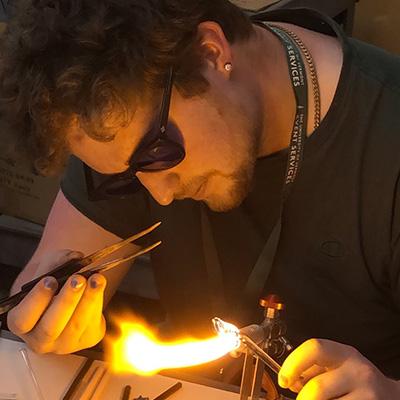
Co-Op Food Stores
Brett Shultz, University of New Hampshire, B.S. Business Administration: Entrepreneurial Studies and Finance Options, Sustainability Dual Major ‘26
Brett is working to improve the Co-op's environmental, social, and governance (ESG) program using the B Impact Assessment. Brett is specifically focused on improving the Co-op's environmental performance, including waste generation, energy use, water usage, and carbon emissions. The goal is to create an Environmental Management System and set targets for improvement across the organization. Brett is also working on improving engagement and transparency with employees and members.

Hurricane Island
Arielle Kotulak, University of New Hampshire, B.S. Environmental Science: Ecosystems, minor in Earth Science ‘24
Arielle is responsible for strategizing the integration of a new sustainable Field Research System onto the existing solar-powered micro-grid. In addition, Arielle is supporting the facilities team in upgrading the island's sustainability systems while educating visitors and summer program participants on how these systems work. Lastly, Arielle is co-leading a ten-day education intensive for high school students focused on sustainability leadership practices.
This Fellowship position is proudly supported by Tom’s of Maine.
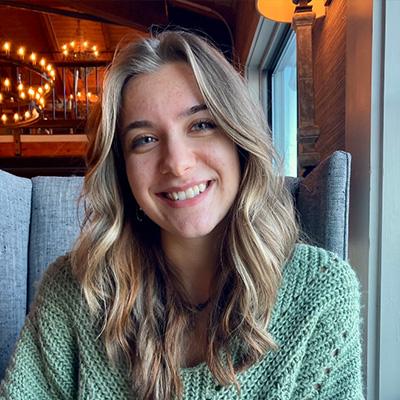
Hypertherm
Nathan Maybach, University of New Hampshire, B.A. Sustainability, B.A. Women’s and Gender Studies, minor in Social Work ‘24
Nathan is working on a project to create an index of applicable awards across the region, nation, and globe that Hypertherm could consider for the benefits of learning, benchmarking, and recognition. Nathan is also completing at least one application for an award or assessment. The goal of the project is for Hypertherm to benefit from benchmarking, ranking, comparison to other organizations, and possible recognition amongst peers, communities, job candidates and pride for existing associates. The categories in which Hypertherm aims to benchmark itself and learn best practices from others include Corporate Social Responsibility, Environmental Stewardship, Diversity Equity and Inclusion, Community Engagement and Service, Philanthropy, Recovery Friendly Workplace, and employee-focused innovative benefits.

Lonza Biologics: Corporate Citizenship Fellow
Maria Jacques, University of New Hampshire, B.S. Business Administration: Management, B.S. Sustainability ‘24
Maria works independently on environmental, volunteering, sponsorship, and educational outreach projects to solidify the structure of Lonza's Corporate Citizenship Program. This includes incorporating new leads, revising vision and mission goals, increasing visibility for sub-teams, and creating stronger awareness of the program's aims and impacts. The program creates stronger awareness of the Corporate Citizenship mission and work, aligns efforts on global alignment, coordinates meetings, and explores volunteering opportunities with local non-profits.

Lonza Biologics: Lonza 2030 Sustainability Roadmap
John Webb, University of New Hampshire, B.S. Applied Mathematics: Fluid Dynamics ‘24, Great Bay Community College, A.A. Teacher Preparation ‘22
John analyzes and tracks progress on Lonza's 2030 sustainability goals for energy, greenhouse gases, waste, and water. John reviews a four-pronged sustainability study completed by consultants and assesses the impact of each project implemented by Lonza, identifying opportunities for improvement. The outcomes include a report summarizing current accomplishments and identifying gaps in meeting 2030 goals. The Fellowship provides hands-on experience in operational elements of a manufacturing plant, exposure to a team-oriented culture, and designing/implementing solutions to optimize sustainability resources.

New England Young Fishermen’s Alliance
Gabrielle Dziak, University of New Hampshire, B.S. Community and Environmental Planning and Sustainability, minor in Business Administration ‘24
Gabrielle is documenting the lives of young fishermen and women in southern Maine and New Hampshire who are involved in ground fishing, crabbing, and lobstering. The project will showcase these individuals as dedicated stewards of the sea and tradespeople committed to pursuing a life on the water. Gabrielle is capturing the essence of the working waterfronts in northern New England, with a focus on fishing ports in York, Kittery, Portsmouth, Rye, and Seabrook/Hampton Harbor. Gabrielle produces media in the form of photos and short videos that are shared on all social media platforms and the New England Young Fishermen's Alliance's developing website. The project provides the Fellow with an opportunity to gain knowledge about the diversity and dynamic nature of the small boat fishing industry and the culture and heritage connected to the commercial fishing industry. The project can also serve as a template for other organizations looking to enhance their mission through storytelling.
This Fellowship position is proudly supported by the Sorensen Family Endowment.

New Hampshire Department of Energy
Owen Miller, University of New Hampshire, B.A. Economics: Public Policy and Sustainability, B.A. Philosophy ‘24
Owen is conducting research on income-based renewable energy incentive programs in the US and assessing how they align with the Renewable Energy Fund (REF) requirements and objectives in New Hampshire. Owen is evaluating the existing energy assistance programs for low and moderate-income (LMI) residents in the state. Based on their research, they will provide recommendations for the possible inclusion of income-based incentive programming for the REF to increase efficiency, impact, and equity. Owen will develop a summary report on income-based solar incentive programs, including their positive and negative aspects, and their alignment with the RPS, REF, and other rules and statutes in New Hampshire. Owen will also prepare presentation materials and make recommendations for program opportunities for New Hampshire.
This Fellowship position is proudly supported by Mascoma Bank.

New Hampshire Network for Environment Energy and Climate: Plastics Working Group
Cassie Lafleur, University of New Hampshire, B.S. Chemical Engineering, Minor: Women’s and Gender Studies ‘26
Cassie is working with the Plastics Working Group (PWG), a non-partisan volunteer organization focused on pollution and climate change in New Hampshire. The PWG has created a website called the Ten Towns Toolkit, which provides resources for local actions in plastic reduction. Cassie’s role will be to help create a roadmap for municipal managers across New Hampshire to reduce plastic use and waste. This will involve conducting interviews with managers of municipal facilities, public schools, and elderly care facilities to learn about current plastic use and operational challenges. Cassie will also research successful plastic reduction projects from New Hampshire, the U.S., and abroad, and adapt features of those projects to circumstances in NH public facilities using feedback from PWG members and public sector managers. The roadmap will offer options in the timing and extent of project implementation and address logistical and financial challenges and solutions. Cassie will produce a written report, fact sheets, and a video slide deck presentation to engage municipal managers across the state and beyond.
This Fellowship position is proudly supported by Mascoma Bank.

NH Coalition Against Domestic Violence (NHCADSV)
Suzanne Scharff, University of New Hampshire, B.A. Women's and Gender Studies, Sustainability Dual Major, minor in Philosophy ‘24
Suzanne is researching and discovering banks, credit unions, and credit counseling services across the state to support economic justice work at the NHCADSV. Suzanne is developing a training and curriculum series to raise awareness among financial institutions and credit counseling agencies about the impacts of financial abuse on survivors of domestic and sexual violence. Suzanne is also building a directory of banking resources to be the target audience for these presentations. Suzanne will develop a training and curriculum series around equity and the disproportionate impacts of financial abuse on BIPOC and LGBTQ+ communities which will support a myriad of lasting impacts in the economic justice program, including increasing community awareness of the impacts of domestic violence, sexual assault, stalking, and human trafficking within the context of financial abuse.
This Fellowship position is proudly supported by UNH College of Liberal Arts' Responsible Governance and Sustainable Citizenship Project.

Prime Buchholz
Alyssa Morrison, University of New Hampshire, B.S. Business Administration: Information Systems & Business Analytics, Sustainability Dual Major ‘24
Sara Carleo, University of New Hampshire, B.S. Business Administration: Information Systems & Business Analytics, Sustainability Dual Major ‘24
Alyssa and Sara are responsible for engaging investment managers on their environmental, social, and governance (ESG) and diversity, equity, and inclusion (DEI) practices, assessing and scoring them, and updating the information in a central data repository. Alyssa and Sara also participate in meetings with the Firm’s Mission‐Aligned Investment Committee, make recommendations to improve the survey and reporting, and identify ways to augment sustainability efforts at the firm. Additionally, Alyssa and Sara will analyze and summarize the findings, produce a report for clients, and present the findings and report to senior leadership.


Replenish Refillery
Madeline Linhart, University of New Hampshire, B.S. Environmental Conservation and Sustainability ‘24
Madeline is building additional programming and data information for Replenish Refillery's customers to reference and provide input on low-waste living and sustainability. Madeline’s work will grow the educational aspects of the shop, focusing on programming and quantitative comparisons between traditional grocery store/pharmacy shopping and refillery shopping, as well as the environmental impact of plastic production, endocrine disruptors, and other packaging and production-related issues. Madeline is creating various educational resources, such as workshops and presentations, cross-comparisons of products, data analysis of brands, and toolkits for customers.
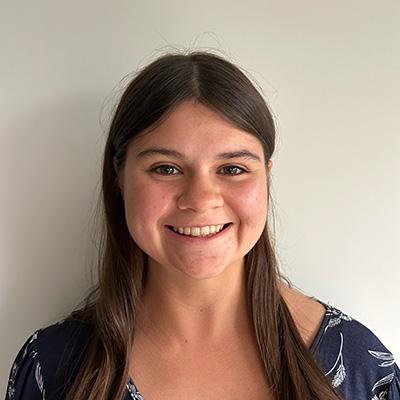
ReVision Energy
Piper Cobak, University of New Hampshire, B.S. Environmental Conservation and Sustainability ‘24
Piper is researching and analyzing local town and utility residential solar permitting requirements. The aim of the project is to gather relevant information that will be used to streamline the design and installation of residential solar projects. The expected outcome is the development of a local solar permitting resource to aid in the development of residential solar permitting policies.

Scrapp
Grace Rau, University of New Hampshire, B.S. Environmental Conservation and Sustainability ‘24
Grace is expanding the reach of Scrapp. Grace is contacting potential clients through various channels such as attending conferences, content marketing, and direct outreach to initiate sales conversations. Grace will identify brands eligible for the Scrapp Verified program, facilitate the data handover process, and identify businesses looking to meet zero waste goals. Grace will also identify potential services to offer and scout sustainable brands and retailers for potential partnerships.

Seacoast Eat Local
Emily Abrusci, University of New Hampshire, B.S. Environmental Conservation and Sustainability, Eco Gastronomy Dual Major ‘24
Emily is identifying strategies to attract new customers to farmers' markets in the Seacoast region. With the recent shift away from farmers' markets due to the pandemic, Seacoast Eat Local is struggling to recruit and retain vendors, which has resulted in a decrease in shoppers. Emily will conduct market research to better understand the needs of the community and design a more inclusive farmers' market.
This Fellowship position is proudly supported by Unitil Corporation.

Sustainable Business Network of Massachusetts
Ella Norenberg, University of New Hampshire, B.A. Psychology, EcoGastronomy Dual Major ‘24
Ella is working on various projects related to local food, communications, graphic design, business development, and event planning. Ella is responsible for creating promotional materials and content for local food businesses and conducting outreach to increase participation in their programs. Ella is also managing social media posts, planning visits to farmers markets, and recruiting volunteers and businesses for the Boston Local Food Festival.

UNH College of Engineering and Physical Sciences (CEPS) Technical Service Center
Pedro Doukas, University of New Hampshire, B.S. Mechanical Engineering
Pedro is collaborating with the UNH Technology Support Center team to learn how the CEPS waste stream is generated, develop a recycling program for concrete and asphalt waste generated by the Civil and Environmental Engineering Labs, evaluate previous years' equipment and building furnishing recycling, and develop an education plan focused on increasing recycling in CEPS buildings. The goal is to reduce the amount of waste that goes to landfills and increase recycling efficiencies.

W.S. Badger Company
Molly Kent, University of New Hampshire, B.A. English and Women’s and Gender Studies ‘24
Molly is creating process recommendations for adopting inclusion and equity practices that ensure Badger's products and marketing are inclusive and reflective of a diverse demographic. Molly is working with staff in product development and marketing to audit current practices, procedures, and language, and then creating and conducting surveys to understand the nuances behind their internal and external audience's identities. The goal is to compile observations and recommendations for changing processes and language, resulting in a suggested language list that will be used to conduct audits and processes throughout the company, including operations, administration, and external communication.

Wyman’s
Durga Raja, University of New Hampshire, B.S. Environmental and Resource Economics, Sustainability Dual Major ‘25
Durga is conducting a scope 3 greenhouse gas inventory for Wyman's, an international frozen fruit company. The focus of the inventory is to calculate and reduce their upstream and downstream carbon emissions, which will include international and domestic shipping, warehousing, packaging, and co-pack manufacturing operations. Durga will identify which scope 3 categories are relevant and feasible to calculate and prepare a technical report summarizing the methodology, results, and recommendations. The ultimate goal is to incorporate emissions data and modeling into everyday business decisions to enhance sustainability and reduce overall contribution to climate change.

City of Dover, New Hampshire
Peder Franson
University of New Hampshire, Masters of Science, Environmental Engineering, Concentration in Water Resources ‘23
University of North Carolina Wilmington, Bachelors of Science, Physics, December ‘17
Peder, the Renewable Energy Analysis Fellow, is developing and analyzing scenario projections to explore the costs, feasibility, and benefits of implementing different renewable energy systems and technologies at various City of Dover locations. This scenario analysis requires research, data analysis, and modeling, utilizing available energy data, the latest relevant literature, and best practices from other municipalities and organizations across the state, region, and country. Peder's work will help the City of Dover meet its goal of achieving 100% renewable energy for City-owned property by 2035.

Community Development Finance Authority (CDFA)
Maddie Smith, University of New Hampshire, PhD Natural Resources and Environmental Studies ‘24, M.S. Kinesiology: Outdoor Education ‘16
Northeastern University, B.A. Art, minor in Business Administration ‘11
Maddie is developing a methodology and implementing a Community Facilities Study for the State of New Hampshire, as part of the Community facilities team of CDFA. The project aims to create an inventory of all of New Hampshire's community facilities and assess their ability to meet the changing needs of the community. Maddie’s responsibilities include reviewing approaches to surveying community facilities, assessing available data, and performing benchmarking analyses.

Delaware Valley Regional Planning Commission
Nadine Snyder, University of California Santa Barbara, Master of Environmental Science and Management ‘24
Gettysburg College, B.S. Environmental Studies and Public Policy ‘21
Nadine is collaborating with the Delaware Valley Regional Planning Commission (DVRPC) on the development of a regional benchmarking program that will bring together multiple municipalities across the Southeast Pennsylvania region to overcome the barriers of creating individual programs due to limited resources and expertise. Nadine is supporting DVRPC staff with data analysis, research, and stakeholder engagement activities integral for the program development process, as well as working on tasks such as data analysis, stakeholder outreach and engagement, and research of energy incentives, policies, and opportunities.

Environmental Protection Agency (EPA)
José Becerra Vera, Purdue University, PhD Anthropology ‘25, M.S. Anthropology ‘21
California State Polytechnic University, B.S. Anthropology ‘19
San Bernardino College, A.A. Liberal Arts ‘17
José is working with the Stakeholder Engagement Branch in the Office of Pollution Prevention and Toxics to support stakeholder outreach for toxics policy development. José is involved in two projects - one is implementing an initiative to increase awareness of lead-based paint issues among environmental justice community members, and the other is to help the branch reach out to environmental justice community leaders to discuss Toxic Substances Control Act (TSCA) chemical issues.

Green Wave Electric Vehicles
Beatriz Olivieri, University of Massachusetts Amherst, M.S. Sustainability Science: Urban Sustainability ‘23 Rollins College, B.A. International Relations, minors in Economics and Sustainable Development ‘22
Beatriz is creating and shaping the Chief Sustainability Office position, developing a Sustainability Plan for Green Wave EV, and designing an updated Employee Handbook that promotes sustainable policies and procedures. The Sustainability Plan will balance organizational objectives while ensuring that Green Wave has suppliers that are affordable and can provide timely products and services. Beatriz will also integrate sustainable policies and procedures into a legally compliant employee handbook.

Lindt & Sprungli, USA
Jenna D'Arcy, University of New Hampshire, B.S. Community & Environmental Planning, Sustainability Dual Major '22
Jenna is working on the 'Road to Zero Waste' project, which is part of a larger sustainability initiative at Lindt USA to reduce the environmental impact of business operations by reducing waste. The goal of the project is to develop a comprehensive plan to increase recycling rates across the Lindt Stratham campus by improving recycling practices and material flows. Victoria will develop recommendations for improvements and clear directives for implementation, as well as training and communication materials to drive recycling compliance across the site.

New Hampshire Community Loan Fund
Veronica Gassert, Vermont Law & Graduate School, JD ‘24
Master of Food and Agriculture Law & Policy ‘21
Northeastern University, B.S. Environmental Science ‘14
Veronica is developing tools to identify climate-friendly agricultural practices and financial barriers to their implementation. The goal is to help fill the gap between the potential for carbon sequestration and climate benefits from agriculture in the Northeast and the limited adoption of these practices due to financial and carbon measurement barriers. Veronica will evaluate existing programs and establish a matrix of practices based on several implementation barriers. Veronica will also develop a financial ranking tool to identify the highest and best climate risk mitigation practices for farm businesses in the Northeast region, as well as interview or survey farm businesses and service providers to understand their priorities and needs for technical assistance and financial incentives.
This Fellowship position is proudly supported by Bangor Savings Bank.
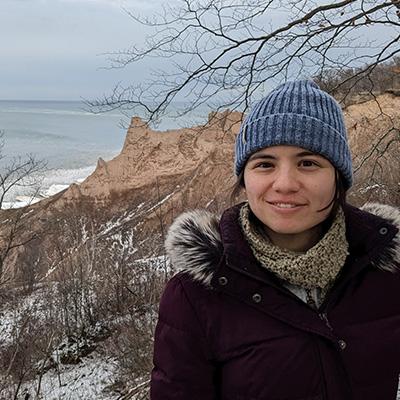
Pete and Gerry’s Organics, LLC
Ian Moore, University of New Hampshire, B.S. Environmental Conservation and Sustainability, minor in Business Administration ‘23
Ian is identifying opportunities for reducing energy consumption and exploring alternative energy solutions for Pete and Gerry's processing operations and partner farms. Ian is collaborating with team members from various departments at Pete and Gerry's Monroe, NH Processing Facility to understand which aspects consume the most energy and develop a plan for reduction. Ian will also work with two New England-based Pete and Gerry's farms, one powered by solar and the other on the electrical grid, to create a guide for other farmers considering alternative energy opportunities for their own farms.

Tom’s of Maine
Emily Stanislawzyk, Tufts University, M.S. Nutrition: Agriculture, Food & Environment ‘24
University of Vermont, B.S. Community and International Development, minor in Food Systems ‘16
Emily is supporting Tom’s of Maine’s Steward for Sustainability and Everyday Good with creating workplans for 2025 by identifying opportunities to enhance the ESG reports. Emily is reviewing carbon footprint analyses, creating analysis goals for the 2022 Goodness Report, and conducting a landscape analysis of like-minded brands through identifying gaps and opportunities.

Town of Amherst Massachusetts - Municipal Building Inventory
Miguel Gothers-Reyes, University of Massachusetts Amherst, M.S. Sustainability Science: Renewable Energy and Efficient Design ‘23
B.A. Economics, minor in Studio Art ‘11
Miguel is working with the Director of Sustainability and the Municipal Facilities Manager to compile an inventory of all municipal building stock and its associated HVAC technology. Miguel is also identifying a timeline to transition systems to alternative renewable technologies. This project serves to satisfy the Town Manager’s obligation to provide a timeline for replacing building fossil fuel systems with alternative renewable technology sources. As such, the inventory and timeline will serve as a pathway in moving the municipal building stock towards electrification.

Town of Amherst, Massachusetts - Green House Gas Inventory
Caitlin Hart
Tufts University, MS (candidate), Environmental Policy and Planning, ‘23
Savannah College of Art and Design, MFA, Historic Preservation, ‘14
Tufts University, BA, Art History, ‘10
Caitlin Hart is calculating an updated greenhouse gas emissions inventory and drafting a supporting report that will identify whether the town is meeting its short-term goal of reducing greenhouse gas emissions 25% below 2016 levels by 2025. The Town’s community emissions inventory was prepared in accordance with the guidance provided in the Global Protocol for Community-Scale Greenhouse Gas Emissions Inventories (GPC). The report will provide analysis of where the town is most successfully reducing emissions and where additional efforts and focus may be needed. The findings and recommendations will be incorporated into the Town’s sustainability plans.

Town of Durham, New Hampshire
Erin Dennehy, Indiana University, MPA, Dual Concentration in Community & Economic Development and Sustainability & Sustainable Development ‘24
College of the Holy Cross, B.A. Environmental Studies and Sociology ‘19
Erin is completing an updated Greenhouse Gas Emissions Analysis (GHG) for Durham, monitoring and reporting on the town's Climate Action Plan, submitting 2023 reporting deliverables to the Global Covenant of Mayors for Climate and Energy GCoM, engaging with the community on sustainability efforts, attending bimonthly staff meetings to keep municipal departments updated, supporting GHG reduction projects, and collaborating with key community partners. Erin will be responsible for creating an updated municipal and community greenhouse gas inventory report, delivering presentations to the Durham Town Council and stakeholders, and potentially developing outreach materials related to specific reduction initiatives or strategies.

Town of Groton, Connecticut
Clare McCarthy, Emory University, MPH Environmental Health, Climate and Health Certificate ‘24
B.S. Environmental Sciences, minors in Community Building and Social Change ‘23
Clare McCarthy is researching the impacts of extreme heat as a consequence of climate change, and how it affects the Town of Groton's neighborhoods and communities. Clare is investigating ways to reduce heat vulnerability and increase heat resilience, with a focus on socioeconomically vulnerable populations. Clare will also work with Town staff to prioritize strategies and develop at least one of them for implementation.

UNH Center for Business Analytics
Maddy Warren, University of New Hampshire, MBA: Businesses Analytics and Marketing ‘23
Texas Christian University, Bachelor of Business Administration: Finance and Accounting ‘22
Maddy is developing a prototype software platform to address the challenge of food waste in the perishable food industry. Using raw production and supply chain data from When Pigs Fly Breads as a proof-of-concept, Maddy will create a real-time predictive analytics system that better connects producers of perishable goods with potential customers, such as food banks and schools, via a user interface. The platform will provide suppliers with "impact reports" on donations and placement of goods to incentivize continued contributions, and the ultimate goal is to use the research and deliverables as a proof-of-concept for other perishable food industries.

UNH Energy & Utilities
Illustrious Amaewhule Ewhorlu, Tufts University, M.S. Sustainability ‘24
Peoples’ Friendship University of Russia, Bachelor of Power Engineering ‘20
Illustrious is currently working on a comprehensive decarbonization plan for the Energy & Utilities department at UNH. The main objective is to determine a baseline of where the department stands today in terms of carbon emissions, major equipment, and building systems that need replacement in the short-term. After establishing the baseline, the focus will be on researching technologies that could allow for decarbonization of UNH's district energy system and creating guidelines for UNH Energy & Utilities to develop an RFP for consulting firms who specialize in decarbonization planning. The final report will be the Energy & Utilities roadmap for moving forward with a formal planning process, providing recommendations for implementation timeline and next steps. This project will be the first step in the department-specific approach to document and plan for decarbonization by 2050.
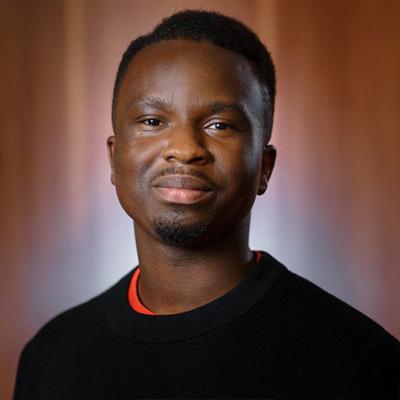
UNH Sustainability Institute Carbon Clinic
Marie Collins, University of New Hampshire, PhD Education: Curriculum & Instruction ‘24, MEd Elementary Education ‘14, B.A. Music Education ‘13
Marie is improving the teaching materials for UNH's Carbon Clinic, a course designed to train students in greenhouse gas accounting. With a growing need for a workforce trained in reducing climate impact, effective teaching materials are essential for scaling the program and reaching more students. Marie is reviewing and updating the course materials, including the syllabus, slide decks, in-class data exercises, and homework assignments, to ensure they are clear and effective for students with little to no experience in carbon footprint calculations.

UNH Trash 2 Treasure
Alex Vergara, University of New Hampshire, English, Education, ‘23
Trash 2 Treasure (T2T), launched in 2010 by UNH undergraduates, is the country's first student-led, self-sustaining campus waste reduction program. Alex Vergara is the T2T Fellow responsible for coordinating the summer portion of the program. They work closely with the T2T team, including staff leads and the student core team, ensuring smooth planning and execution of Trash 2 Treasure's collection and sale periods. Alex's responsibilities include recruiting volunteers and core team members, scheduling meetings, planning logistics, organizing storage locations, coordinating waste disposal, maintaining positive relations with the university, and documenting relevant information. Alex will gain valuable skills in mentoring students, managing projects, prioritizing tasks, and effective communication.

Unitil Corporation
Zijing Wang, Northwestern University, M.S. Energy and Sustainability: Energy Financing ‘23
Ohio State University, B.S. Environmental Science ‘21
Zijing is assessing the impacts of increased mean temperatures and extreme temperature events on Unitil's power distribution infrastructure, which is responsible for delivering reliable and safe energy to customers in Maine, Massachusetts, and New Hampshire. The goal is to evaluate multiple scenarios of climate-related temperature increases and translate them into a report of the impacts on Unitil's physical assets. Zijing will conduct desk research using peer utilities' climate impact reports, public climate data sets, and Unitil's internal GIS-based asset information. The deliverables of this fellowship include a report detailing Unitil's at-risk assets due to expected mean temperature increases from climate change and a presentation of findings to the Vice President of Engineering and other Unitil executive team members.

Worthen Industries, Inc
Daniel Yahya, Auburn University, PhD Civil Engineering ‘25
University of Ibadan, B.S. Civil Engineering ‘19
Daniel is analyzing the upstream product greenhouse gas emissions for several of the products manufactured by Worthen Industries, a family-owned manufacturing company. The goal is to calculate the upstream product carbon footprints for these products and develop a procedure that can be used for other products, identifying opportunities to improve the sustainability of Worthen's supply chain. The objective of this Fellowship is to provide clear and well-documented calculations of upstream product carbon footprints, including a report documenting the methods and figures and graphics for communicating the results to internal stakeholders and customers. These deliverables will be used by Worthen Industries to share their current product carbon emissions and identify opportunities for reductions.

